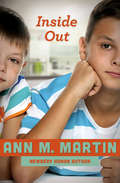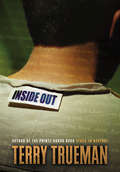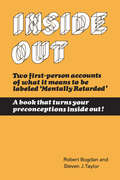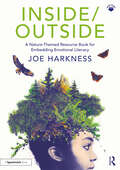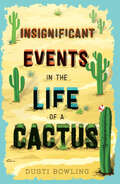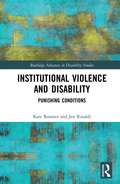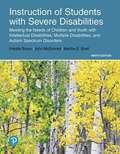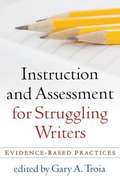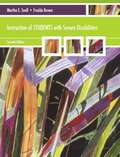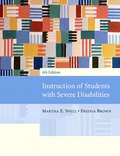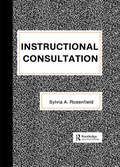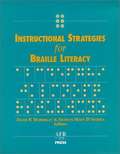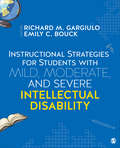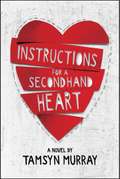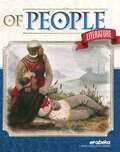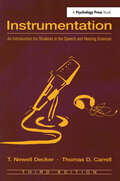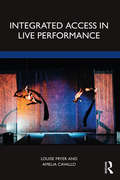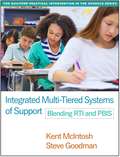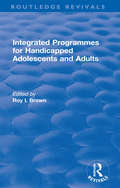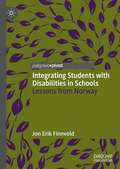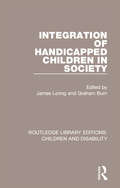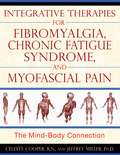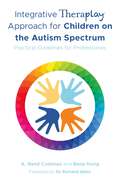- Table View
- List View
Inside Out
by Ann M. MartinHow do you love someone who makes you miserable? Eleven-year-old Jonathan just wants to have a normal life—for instance, a night when he isn&’t awakened by screams, or a day when he&’s not teased by other kids for having a disabled family member. But normal can&’t happen when your little brother is severely autistic.James, Jonathan&’s four-year-old brother, needs more help than his parents can give him. And it&’s not just hard for Jonathan—it&’s causing strife for the whole family. When James gets into a special school for autistic children, Jonathan and his sister have to make a lot of sacrifices so he can go. Jonathan comes up with an idea to help out the family—but will his plan work, or only lead to more teasing?This ebook features an illustrated personal history of Ann M. Martin, including rare images from the author&’s collection.
Inside Out
by Terry TruemanIn a busy coffee shop, a robbery goes wrong. Two gunmen hold seven hostages, including teenager Zach Wahhsted. What nobody realizes at first is that Zach is anything but ordinary and his troubled mind is more dangerous than any weapon. Terry Trueman has created a compelling character with the same shocking power and heartbreaking compassion as his Printz Honor Award debut novel, Stuck in Neutral. Ages 12+
Inside Out: The Social Meaning of Mental Retardation
by Steven J. Taylor Robert Bogdan Seymour B. Sarason'We have to assume that the mind is working no matter what it looks like on the outside. We can't just judge by appearance...If you take away the label they are human beings.' Ed MurphyWhat does it mean to be 'mentally retarded'? Professors Bogdan and Taylor have interviewed two experts, 'Ed Murphy' and 'Pattie Burt,' for answers. Ed and Pattie, former inmates of institutions for the retarded, tell us in their own words.Their autobiographies are not always pleasant reading. They describe the physical, mental, and emotional abuses heaped upon them throughout their youth and young adulthood; being spurned, neglected, and ultimately abandoned by family and friends; being labelled and stigmatized by social service professionals armed with tests and preconceptions; being incarcerated and depersonalized by the state.Ed and Pattie survived these experiences--evidence, perhaps, of the indefatigable will of the human spirit to assert its essential humanity--but the wounds they have suffered, and the scars they bear, have not been overcome. They are now contributing, independent, members of society, but the stigma of 'mental retardation' remains.Their stories are both true and representative--powerful indictments of our knowledge of, our thinking about, and our ministrations to, the mentally handicapped. The interviewers argue that Ed and Pattie challenge the very concept of 'mental retardation.' Retardation, they assert, is an 'imaginary disease'; our attempts to 'cure' it are a hoax.Read Ed's and Pattie's accounts and judge for yourself.
Inside/Outside: A Nature-Themed Resource Book for Embedding Emotional Literacy
by Joe HarknessInside/Outside is a unique educational resource for those working with young people of secondary school age, providing a variety of tried-and-tested indoor and outdoor lessons and activities to promote and embed emotional literacy. The book is divided into three accessible sections: emotions and feelings; self and situation; and mental health and wellbeing; which each cover a variety of themes, from anxiety and depression, to happiness, communication, and confidence. For each theme, ‘inside’ and ‘outside’ activities are offered, with inside activities inspiring students to self-reflect and develop empathy for others, and those outside drawing heavily on nature and learning outside the classroom. The ‘outside’ activities are adaptable and have been designed to work in any available outdoor space, and all activities can be used either in standalone lessons or sequentially, with introductory tasks, group activities, and circle time discussions. With a focus on equipping students with meaningful and tangible skills to support them in the recognition, identification, and expression of their emotions, Inside/Outside will be a valuable resource for teachers, youth workers, home-educators and anyone else looking to facilitate nature connection and introspection in children aged eleven to sixteen.
Insignificant Events in the Life of a Cactus (Life of a Cactus #1)
by Dusti Bowling&“Aven is a perky, hilarious, and inspiring protagonist whose attitude and humor will linger even after the last page has turned.&” —School Library Journal (Starred review) Aven Green loves to tell people that she lost her arms in an alligator wrestling match, or a wildfire in Tanzania, but the truth is she was born without them. And when her parents take a job running Stagecoach Pass, a rundown western theme park in Arizona, Aven moves with them across the country knowing that she&’ll have to answer the question over and over again. Her new life takes an unexpected turn when she bonds with Connor, a classmate who also feels isolated because of his own disability, and they discover a room at Stagecoach Pass that holds bigger secrets than Aven ever could have imagined. It&’s hard to solve a mystery, help a friend, and face your worst fears. But Aven&’s about to discover she can do it all . . . even without arms.Autumn 2017 Kids&’ Indie Next Pick Junior Library Guild Selection Library of Congress's 52 Great Reads List 2018
Institutional Violence and Disability: Punishing Conditions (Routledge Advances in Disability Studies)
by Kate Rossiter Jen Rinaldi"This was several times with that damn cribbage board. I hate cribbage boards to this very day. They never beat us on the arms or legs or stuff, it was always on the bottom of the feet, I couldn't figure it out." Brian L., Huronia Regional Centre Survivor Over the past two decades, the public has borne witness to ongoing revelations of shocking, intense, and even sadistic forms of violence in spaces meant to provide care. This has been particularly true in institutions designed to care for people with disabilities. In this work, the authors not only describe institutional violence, but work to make sense of how and why institutional violence within care settings is both so pervasive and so profound. Drawing on a wide range of primary data, including oral histories of institutional survivors and staff, ethnographic observation, legal proceedings and archival data, this book asks: What does institutional violence look like in practice and how might it be usefully categorized? How have extreme forms violence and neglect come to be the cultural norm across institutions? What organizational strategies in institutions foster the abdication of personal morality and therefore violence? How is institutional care the crucial "first step" in creating a culture that accepts violence as the norm? This highly interdisciplinary work develops scholarly analysis of the history and importance of institutional violence and, as such, is of particular interest to scholars whose work engages with issues of disability, health care law and policy, violence, incarceration, organizational behaviour, and critical theory.
Instruction Manual for Braille Transcribing
by Constance Risjord Library Of Congress National Library Service for the Blind Physically Handicapped StaffThe courses leading to certification as a braille transcriber or proofreader have been administered by the National Federation of the Blind (NFB) under a contract with and on behalf of the National Library Service for the Blind and Physically Handicapped, Library of Congress (NLS).
Instruction Of Students With Severe Disabilities
by Fredda Brown John McDonnell Martha SnellIn this authoritative guide, leading scholars and researchers present information and evidence-based practices for dealing with the full range of curriculum and instruction for individuals with severe intellectual disabilities and autism. Case studies throughout Instruction of Students with Severe Disabilities look at students of various ages and with a variety of disabilities, and each chapter includes an application to a student with autism. The content is presented with citations of supportive research, and evidence-based practices are presented in clearly defined ways to ensure that teachers understand the practices and how to apply them in their own classrooms.
Instruction and Assessment for Struggling Writers
by Gary TroiaThis unique book focuses on how to provide effective instruction to K-12 students who find writing challenging, including English language learners and those with learning disabilities or language impairments. Prominent experts illuminate the nature of writing difficulties and offer practical suggestions for building students' skills at the word, sentence, and text levels. Topics include writing workshop instruction; strategies to support the writing process, motivation, and self-regulation; composing in the content areas; classroom technologies; spelling instruction for diverse learners; and assessment approaches. Every chapter is grounded in research and geared to the real-world needs of in-service and preservice teachers in general and special education settings.
Instruction of Students with Severe Disabilities
by Martha E. Snell Fredda BrownThe seventh edition of this widely-adopted text for special educators addresses the full-range of curriculum and instructional topics involved in educating individuals with moderate, severe, and multiple disabilities. Evidence-based practices are presented in clearly-defined ways so that teachers can easily understand the research presented and apply it in the real classroom. All chapters in the book are unique, written by leaders in the field known for their research and writing on the specific topics. Case studies of students are applied to chapter content in vignettes, tables, and figures found throughout the chapters, and the textbook rests on a solid evidence-base with research citations provided. The new edition features many new updates including: a greater emphasis on teaching students with autism; six new chapters authored by experts in the field; more information on teaching methods supported by research, peer support, teaching academic skills, the process for planning and implementing instruction within general education classrooms, transition planning, and alternate assessment.
Instruction of Students with Severe Disabilities
by Martha E. SnellThis book examines the principles behind teaching students with severe and multiple disabilities. This edition includes a stronger focus on positive behavior interventions and supports, and additional strategies on peer relationships.
Instructional Consultation (School Psychology Series)
by Sylvia RosenfieldRecent changes in policy and law, along with advances in research, are making it necessary for an increasing number of school psychologists, special educators, and teacher consultants to develop skills in areas other than psychoeducational assessment. In response to this need, many professionals and students are expanding their careers to include the field of instructional consultation -- the synthesis of school- based consultation techniques and a solid knowledge of effective instructional practices. This book examines the major themes of instruction and gives a step-by-step outline of the consultation process from referral to the final report. Recent changes in policy and law, along with advances in research, are making it necessary for an increasing number of school psychologists, special educators, and teacher consultants to develop skills in areas other than psychoeducational assessment. In response to this need, many professionals and students are expanding their careers to include the field of instructional consultation -- the synthesis of school- based consultation techniques and a solid knowledge of effective instructional practices. This book examines the major themes of instruction and gives a step-by-step outline of the consultation process from referral to the final report.
Instructional Strategies for Braille Literacy
by Diane P. Wormsley Frances M. D'AndreaOffers instructors specific, practical strategies for the teaching of Braille reading and writing. Chapters discuss general guidelines and strategies; fostering emergent learning; making the transition from print to Brail teaching Braille to students with special needs, and to students who speak English as a second langua assessing the literary skills of students who are blind or visually impaired; and technology and Braille. Annotation copyrighted by Book News, Inc. , Portland, OR
Instructional Strategies for Students With Mild, Moderate, and Severe Intellectual Disability
by Richard M. Gargiulo Emily C. BouckStrategies for Students with Mild, Moderate, and Severe Intellectual Disabilities is a textbook for undergraduate and graduate students enrolled in special and general education teacher preparation programs (as well as practicing professionals) offering a solid, research based text on instructional methodologies for teaching students with intellectual disability across the spectrum of intellectual abilities. The book addresses both academic and functional curricula in addition to behavioral interventions. Additionally, Instructional Strategies for Students Mild, Moderate, and Severe Intellectual Disability adopts developmental or life span approach covering preschool through adolescence and young adulthood.
Instructional Strategies for Students With Mild, Moderate, and Severe Intellectual Disability
by Richard M. Gargiulo Emily C. BouckStrategies for Students with Mild, Moderate, and Severe Intellectual Disabilities is a textbook for undergraduate and graduate students enrolled in special and general education teacher preparation programs (as well as practicing professionals) offering a solid, research based text on instructional methodologies for teaching students with intellectual disability across the spectrum of intellectual abilities. The book addresses both academic and functional curricula in addition to behavioral interventions. Additionally, Instructional Strategies for Students Mild, Moderate, and Severe Intellectual Disability adopts developmental or life span approach covering preschool through adolescence and young adulthood.
Instructions for a Secondhand Heart
by Tamsyn MurrayA moving novel about grief, guilt, and the unpredictability of love, for fans of Everything, Everything and All the Bright Places. Jonny knows better than anyone that life is full of cruel ironies. He's spent every day in a hospital hooked up to machines to keep his heart ticking. Then when a donor match is found for Jonny's heart, that turns out to be the cruelest irony of all. Because for Jonny's life to finally start, someone else's had to end. That someone turns out to be Neve's twin brother, Leo. When Leo was alive, all Neve wanted was for him (and all his glorious, overshadowing perfection) to leave. Now that Leo's actually gone forever, Neve has no idea how to move forward. Then Jonny walks into her life looking for answers, her brother's heart beating in his chest, and everything starts to change. Together, Neve and Jonny will have to face the future, no matter how frightening it is, while also learning to heal their hearts, no matter how much it hurts.(Features select illustrations from "Jonny's" sketchbook.)
Instrumental Music for Dyslexics: A Teaching Handbook
by Sheila OglethorpeInstrumental Music for Dyslexics is written mainly for music teachers. It describes dyslexia in layman's terms and explains how the various problems which a dyslexic may have can affect all aspects of learning to play a musical instrument. It alerts the music teacher with a problem pupil to the possibilities of that pupil's having some form of dyslexia. Although Sheila Oglethorpe is primarily a piano teacher the general principle behind most, if not all, the suggestions is such that they can be adapted for use by other instrumentalists. The book presents ways in which the music teacher can contribute to the self esteem and thereby the general welfare of the dyslexic pupil who is often musically gifted and has much to offer. The book will also be of interest to dyslexia specialists who have hitherto directed their concentration towards the language-based problems of the dyslexic.
Instrumentation: An Introduction for Students in the Speech and Hearing Sciences
by T. Newell Decker Thomas D. CarrellWhile keeping the scope and essential thrust of the original book unchanged, this third edition has been updated to reflect the latest technology. For instance, important revisions have been made to a few chapters, while one chapter has been eliminated and replaced with a newer chapter dealing with recent developments in digital and consumer electronics that are relevant to laboratory instrumentation. The authors hope the readers of this text will be more confident with instrumentation and more willing to experiment with it, as well as be able to appreciate the possible ways that electronic instrumentation can be used in their work. The book was written with the undergraduate in speech and hearing sciences uppermost in mind. Instead of detailed information about individual pieces of instrumentation, a more basic and broad descriptive approach has been used. Throughout, examples have been provided regarding how certain pieces of equipment can be used in the clinic or laboratory. One or more step-by-step exercises are included at the end of certain chapters to help students obtain hands-on experience and equipment flowcharts help reinforce the exercise. Students who complete this book will have a basic understanding of the major pieces of instrumentation in the hearing and speech clinic/laboratory.
Integrated Access in Live Performance
by Louise Fryer Amelia CavalloTwelve per cent of UK theatregoers have a disability. This compares with 18% of the UK’s adult population. Directors can help build audiences as diverse as the population at large by making their art accessible to all. Live performances are increasingly being made accessible to people with sensory impairments not only to satisfy equality laws and the requirements of funding bodies, but also in the interest of diversity and as a catalyst for creativity. But how do you ensure you don’t throw out the access baby with the artistic bathwater? This book draws on the results of the Integrated Access Inquiry: Is It Working? A qualitative study with 20 theatremakers from around the UK, it was commissioned by Extant Theatre – the UK’s leading company of blind and visually impaired people, and combines feedback from disabled audiences with advice from the creative teams who have experimented with integrating access. It discusses the challenges and opportunities of working with disabled actors and building in audience access even before rehearsals begin. It offers strategies, case studies and a step-by-step guide to help creative people integrate access into their live performance for the benefit of all.
Integrated Multi-Tiered Systems Of Support: Blending Rti And Pbis (The Guilford Practical Intervention In The Schools)
by Steve Goodman Kent McIntoshMany schools have implemented academic response to intervention (RTI) and schoolwide positive behavioral interventions and supports (PBIS) as separate initiatives. This book provides keys to making these programs more effective, seamless, efficient, and sustainable by combining them into a single multi-tiered system of support (MTSS). Steps and strategies are outlined for integrating data structures, practices, teams, and district systems. Contributing authors present detailed case examples of successful MTSS implementation in three states. In a large-size format with lay-flat binding, the book features 27 reproducible checklists and evaluation tools. Purchasers get access to a companion website where they can download and print the reproducible materials plus other helpful resources. <p><p> This book is in The Guilford Practical Intervention in the Schools Series, edited by T. Chris Riley-Tillman.
Integrated Programmes for Handicapped Adolescents and Adults
by Roy I. BrownFirst published in 1984, Integrated Programmes for Handicapped Adolescents and Adults explores the need to develop integrated programmes for adolescents and adults with developmental disabilities. Whilst the training models and concepts examined largely relate to formal areas of education, such as reading, mathematics, and writing, the book also pays close attention to social education skills, including home management, budgeting, meal preparation, and the development of positive familial relationships. Integrated Programmes for Handicapped Adolescents and Adults presents a number of projects from different parts of the world, with an emphasis on linking research and practice.
Integrating Students with Disabilities in Schools: Lessons from Norway
by Jon Erik FinnvoldThis book explores the ability of the Norwegian school system to support the achievement of formal competencies among children with physical disabilities, as well as its role in the informal dimensions of social participation and networking. Schools contribute to social inclusion in several ways: they are arenas for building official competencies, ensuring future access and success in the labour market. They are also sites for meeting other children, and developing friendships – friendships are not only important for strengthening cognitive development, but are vital to both good mental health and the building of various forms of social capital. By examining schools and the ways in which inclusion is incorporated early, this book aims to bridge the opportunity and employment gap that people with physical disabilities are more likely to face later in life.
Integration of Handicapped Children in Society (Routledge Library Editions: Children and Disability #9)
by James Loring Graham BurnFirst published in 1975, this book looks at the place of children with handicaps in society, at that time. It argues that in the thirty years previous, a great deal of progress was made in the field of rehabilitation but that the separation between handicapped people and the community was still a challenge. A strong range of contributors discuss approaches to the problem focusing on education, employment, and daily life. Topics covered include the social aspects of integration, through the problems of the multiple-handicapped child, to a survey of disabled students at universities and polytechnics in Great Britain.
Integrative Therapies for Fibromyalgia, Chronic Fatigue Syndrome, and Myofascial Pain
by Celeste Cooper Jeffrey MillerFibromyalgia, chronic myofascial pain, and chronic fatigue are often seen as interchangeable conditions, a belief held even by many health care providers. Nothing could be further from the truth--however, they do often coexist. Knowing if more than one of these disorders is present is extremely important, because the treatment for one of them can often exacerbate the problems caused by the others. Written by a registered nurse and a psychologist who has been treating these conditions since 1994, this book presents an integrative medical approach to these three disorders with a strong emphasis on utilizing and strengthening the mind-body connection to restore well-being. The authors begin with clear diagnostic guidelines for each condition and reference the latest scientific research on what causes these illnesses. Because many medical practitioners are relatively unfamiliar with these disorders, it can take several medical visits to arrive at a definitive diagnosis. Clear communication with medical personnel is key to diagnostic success. This book provides invaluable advice on how to describe symptoms, document health history, and keep a log of medical appointments. Included are interactive worksheets to facilitate these activities. The authors provide a thorough guide to numerous treatment options--from diet, exercise, and herbs to mindfulness meditation, yoga, and nonsteroidal anti-inflammatory drugs (NSAIDs). They also offer techniques to dispel the "brain fog" that these illnesses can create, offer guidance on the psychological issues that accompany these chronic pain disorders, and provide advice on how to build a personal support team. The final chapter gives advice on how to navigate the health care system, including step-by-step instructions for preparing an application to the Social Security Administration for disability benefits. An extensive resource section provides a wealth of contact information for helpful agencies and organizations, good sources for medical supplies, and a wide selection of suggested further reading. In short, this integrative treatment guide will open the door not only to physical recovery but also to emotional, mental, and spiritual well-being. CELESTE COOPER, R.N., worked as a nurse and nurse educator for more than 20 years before being diagnosed with fibromyalgia, chronic myofascial pain, and chronic fatigue syndrome. She is now an advocate for sufferers of these disorders and lives in Missouri and Arizona. JEFFREY MILLER, Ph.D., is a psychologist specializing in chronic illness from a spiritual perspective. He lives in Missouri.
Integrative Theraplay® Approach for Children on the Autism Spectrum: Practical Guidelines for Professionals (Theraplay® Books & Resources)
by Rana Hong A. Rand ColemanCommunication and social skills are a key challenge for children on the autism spectrum, and a fundamental priority for care professionals to support their clients' progress. Using case studies and evidence-based advice, this book guides readers through an integrated Theraplay® approach to helping young people on the autism spectrum. The interventions emphasise interactivity and fun to help children build social and emotional skills through play. From using balloons to encourage eye contact to turn-taking play for fostering social awareness, each Theraplay® activity is tailored to support children on the autism spectrum and includes suggestions for further adaptations to suit each child's unique needs. Parents' and guardians' needs are also addressed in the context of Theraplay®, examining common sources of frustration and providing advice on effective treatment plans. Officially supported by the Theraplay® Institute, this handbook guides readers towards a thoughtful, focused application of Theraplay® to support children on the autism spectrum.
